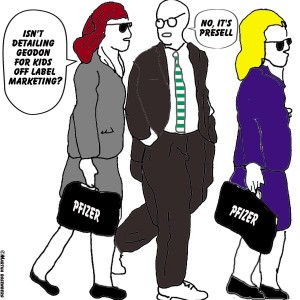Pfizer’s $2.3 billion settlement announced last month by the US Department of Justice, for fraudulent marketing of Bextra, Geodon, Lyrica and Zyvox inducts the world’s biggest drug maker into the pharma Three-Peat Hall of Fame.
It’s only been five years since Pfizer agreed to pay $430 million for seizure drug Neurontin abuses and entered into a Corporate Integrity Agreement (CIA), a trust-but-verify arrangement with the Office of Inspector General of the Department of Health and Human Services, in 2004.
And it’s only been seven years since Pfizer agreed to pay $49 million to settle charges it defrauded Medicaid by overcharging for cholesterol drug Lipitor and entered into another CIA in 2002.
Pfizer’s fraud settlement for pain drug Bextra, withdrawn in 2004, antipsychotic Geodon, seizure drug Lyrica and antibiotic Zyvox is the largest pharmaceutical fraud settlement in the history of the Department of Justice — and the largest criminal fine ever imposed in the United States.
More than 10,000 postal employees on workers compensation were treated with Bextra, Geodon, Lyrica and Zyvox says Joseph Finn, Special Agent in Charge for the Postal Service’s Office of Inspector General. Forty-three states will share in the givebacks.
But it’s the same off-label and kickback tango — causing “false claims to be submitted to government health care programs,” also known as our tax dollars — Pfizer has been charged with before.
For example, Florida’s Medicaid program paid $935,584 for illegal Geodon pediatric prescriptions in 2005 — illegal because Geodon is not approved for children — and Texas’s Medicaid program paid $557,256 for just two months of pediatric Geodon prescriptions, according to the complaint.

It is an irony that even as Pfizer settles the pediatric charges, the FDA is considering its petition to approve Geodon (ziprasidone) for children. Isn’t that a little after the fact?
In June, the FDA Psychopharmacologic Drugs Advisory Committee recommended approval of Geodon for “the acute treatment of manic or mixed episodes associated with bipolar disorder, with or without psychotic features, in children and adolescents ages 10 to 17.”
It’s also an irony that the original safety data on which FDA rejected Geodon as a new drug in 1997 — its side effect of QT interval prolongation which can cause sudden death — are still under debate; at the June meeting, Pfizer doctors admitted to committee members that Geodon can add an extra eight heart beats a minute.
Pfizer doctors referred to the adult study 054 — as they did to convince FDA to overturn Geodon’s rejection in 2001 — and FDA doctors insisted no prior ECG should be necessary, but doctors on the panel were less convinced.
Marsha D. Rappley, MD, Dean of the College of Human Medicine at Michigan State University observed that while the average increased heart beat with Geodon in the presented studies might be five to eight beats per minute, “there was 8 percent of the children or young people who had a pulse over 120. And if I had a 15-year-old who had a sustained pulse of 120, I would worry about that.”
And Christopher B. Granger, MD, Director of Duke University Medical Center’s Cardiac Care Unit and Edward L.C. Pritchett, MD, with Duke’s Cardiology and Clinical Pharmacology division focused on the fact that Geodon’s increased heart rate doesn’t indicate blood pressure is going down as with most drugs.
“You know, the interesting thing here is that the blood pressure has actually gone up, so we have the curious situation of the heart rate and the blood pressure both going up,” said Pritchett.
No one seemed reassured when Tom Tensfeldt, MD with Pfizer’s pharmacokinetics group offered, “There may be a bit of a plateau in the effect, at least on average here.” (Heart beats won’t increase ad infinitum?)
Nor were panelists reassured when Kenneth Towbin, MD, Chief of NIMH’s Clinical Child and Adolescent Psychiatry Mood and Anxiety Disorders Program asked about one of Pfizer’s Geodon post marketing slides, “that revealed cardiopulmonary failure and stroke in children 3 to 17.”
“We had ten reports of death in our post-marketing database in pediatric subjects. One of these subjects was a 16-year-old male who died of cardiopulmonary failure,” said Susan Anway, MD, with Pfizer safety and risk management. “The second case you referred to was a case of stroke — cerebrovascular effects — or event. This was a subject who had many other comorbidities, as well as on a number of other concomitant medications.”
Of course most children given Geodon will have the same “comorbidities” and “concomitant medications.” And thanks to Pfizer fraud the drug’s already in wide pediatric use. So if FDA approves Geodon for children it will be another Three-Peat.










